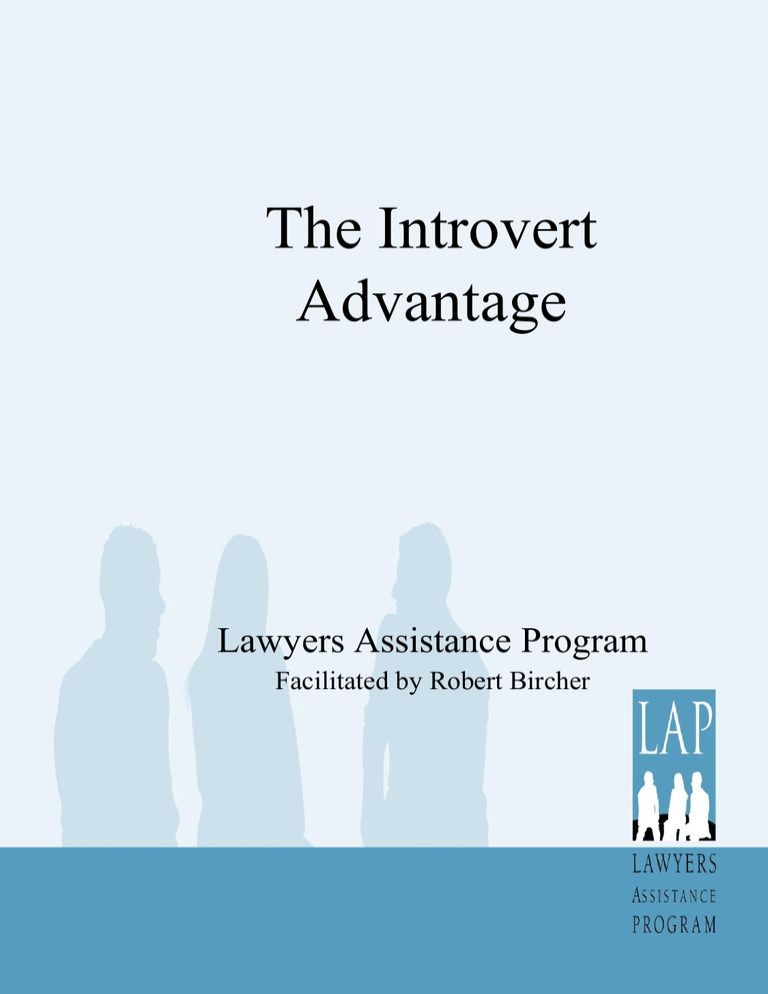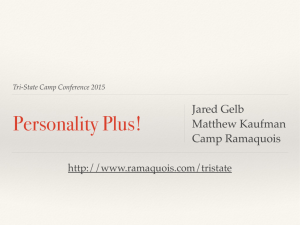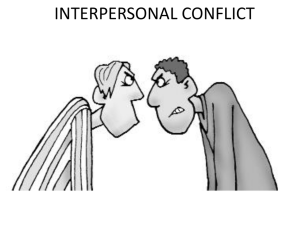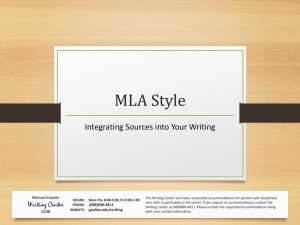The Introvert Advantage - Lawyers Assistance Program of British
advertisement

The Introvert Advantage Lawyers Assistance Program Facilitated by Robert Bircher The Introvert Advantage • This workshop is based on the book by Marti Olsen Laney published in 2002 by Workman Publishing • Few people are extreme introverts or extreme introverts, most of us are somewhere close to the middle of a continuum • Also these are personality temperaments and people can and do bounce around in between them-although the tests will show your particular tendency • The purpose of this workshop is to increase self acceptance of your introversion or extroversion, not to change anything There is nothing wrong with you –you’re just introverted • ¾ of the general population is extroverted, whereas 2/3 of lawyers are introverted • Ever wonder why you feel overwhelmed in situations where others feel invigorated? • Two of my best friends are very extroverted and since I am very introverted the contrast in some situations is remarkable • One friend absolutely loves crowds-the larger and noisier the better-he and I go to the PNE and I can only handle it for about an hour and a half, he gets more energized the longer we stay. If we stay too long, I need to recover by being in a quiet place! Our culture values and rewards extroverts • In North America we value action, speed, competition and drive. • Quietness, reflection and solitude are not valued • Some people even think introversion is some kind of a problem to be overcomesome studies even claim to say extroverts are happier! They are based on the ridiculous assumption that the characteristics of extroverts are the “right” way to be. This is pure nonsense! • Because most people are extroverts, there is always pressure to “shape up and act like the rest of us” this starts even as small children Introversion is Great • It is time to stop trying to fit in and start embracing who you are • Introversion and extroversion are part of a continuum of temperament styles-few people are at the extreme ends of either style and it important to know that you can jump back and forth to the other style • I am introverted but often called upon to do “extroverted things” like teaching, which I do often and have had great success with • A good way to look at it is to imagine an energy scale with introversion and extroversion at opposite ends How do you get energized? • People who are more introverted focus inward to gain energy, extroverts focus outward to gain energy • This fundamental difference explains the differences in behavior • Introverts need to be alone to recharge and need breaks from too much activity • Introverted parents will need more breaks from their children, and more alone time from their spouses. • The world is geared towards extroverts and so are many of the worlds expectations of what lawyers should be like-if you are an introvert in an extrovert world you may feel out of place • Actually there is no problem at all-being introverted is just fine! Qualities of Extroverts • Like to be in the thick of things • Relish variety, bored with sameness • Know lots of people, consider them friends • Enjoy chitchatting, even with strangers • Feel stoked after activity, eager for more • Speak or act without needing to think first • Are generally quite peppy • Tend to talk more than listen Qualities of Introverts • Prefer to relax alone or with a few close friends • Consider only deep relationships as friends • Need rest after outside activities, even ones you enjoy • Often listen but talk a lot about topics of importance to you • Appear calm, self –contained, and like to observe • Tend to think before you speak or act • Experience mind going blank in groups or under pressure • Don't like feeling rushed Misconceptions about Introverts • Introverts need private space to refuel, do not gain energy from external activities, and take time to reflect and think before they speak • They are not loners, shy or antisocial-this is a misconception • They are not reclusive or retiring-many public personalities are introverts • Shyness is social anxiety and can occur in both introverts and extrovert • “Highly Sensitive” is usually a criticism in a law firm but in fact means a person is extremely perceptive, intuitive, observant with a fine sense of discrimination-this can occur in both introverts and extroverts More Misconceptions • Introverts may seem unsocial to extroverts, but are in fact social in a different way • Introverts need fewer relationships, but like more connection and intimacy. Extroverts need more external stimulation since they don’t generate as much internal stimulation as introverts do • Introverts don’t generally like idle chit chat, and since it takes a lot of energy, they prefer more meaty conversations which nourish and energize them • Extroverts get a stimulation hit from social sources and activities Introverts unsettle Extroverts • The qualities of extroverts are a cultural ideal-boldness, individuality and willingness to speak out are highly valued • Introverts tend to: • Keep energy inside; be absorbed in thought; hesitate before speaking; avoid crowds and seek quiet; proceed with caution when meeting people; not offer ideas unless asked, need significant time alone or undisturbed, reflect and act in a careful way; tend not to show emotion • Extroverts may see some or all of this as weird or even believe it is evidence of mental illness! Problems in Understanding Each Other • Extroverts talk and think at the same time-it is effortless to them • Introverts need time to think and don’t speak with spontaneity unless it is a familiar subject • Introverts appear cautious or passive to extroverts • To an extrovert, introverts seem reticent and seem to be hiding or hesitating. An extrovert thinks “just spit it out!” • Introverts will speak out a lot if they feel they know a lot about the subject • To an introvert an extrovert “talks without thinking or speaks with great authority on subjects they know almost nothing about” Culture and Introversion • Our language shows our cultural bias towards extroversion being the “right way to be” • For example; the International Dictionary of Psychology states that introversion is "a major personality trait characterized by a preoccupation with the self, lack of sociability and passiveness” Other definitions are similar • The same dictionary defines extroversion as “a tendency to direct the personality outward, the extrovert is social, a man of action, and one whose motives are conditioned by external events” • The implication is clear-there is something wrong with being introverted Introverts and Extroverts • Introverts tend to speak slowly and are reluctant to speak with extroverts • Introverts dislike interrupting, so they often hold back • Introverts give no hint of mental processes and thus may appear to be passive or uninterested-in fact they are usually just thinking about what people are saying • Extroverts can astonish introverts with their ability to talk with apparent authority on almost any topic-a friend of mine(a hairdresser ,who dropped out high school, once talked to a group of heart surgeons at a social event, with rock solid conviction and authority, about her views on holistic ways to deal with heart problems-her main source was a couple of magazine articles in the National Enquirer-amazingly ,they listened!)-I was shocked Introverts and Extroverts • It drives extroverts crazy when introverts suggest they stop reacting and reflecting before barging ahead. They want them to slow down, plan, think about consequences, and think it through before acting. Extroverts just want to “get it done, fast” • In a world dominated by extroverts, most introverted children grow up receiving the message overtly and covertly that something is wrong with them. Few people grew up with families who accepted and nurtured introverted qualities • The culture promotes extroversion as an ideal, even convincing introverts themselves that they not only have a problem ,they are a problem! Blame, Shame and Introversion • Because of the fact that that extroversion is held to be “normal”, introverts can experience guilt or shame for just being introverted.ie Themselves! • Shame is related to our being, we may feel unworthy or innately flawed. Guilt is the feeling of having done something wrong • The more introverted you are the more likely you are to have encountered shame and guilt about who you are • You can counteract this by self acceptance; realizing there is no problem, also by setting tough boundaries in situations or with people. For example safeguarding your alone time in relationships or saying no to excessive external stimulation Lawyers and Introversion • As a counselor of lawyers I have come across many situations where lawyers think there is something wrong with them because they don't like “marketing or schmoozing with clients” or they have a problem promoting themselves • Many lawyers also have problems with court appearances or media scrums • Many lawyers feel they “shouldn’t feel sensitive or shy” • Many lawyers are told they need to “toughen up” • When you understand introversion and the pathologizing of it-this should should be no surprise Lawyers and Introversion • Lawyers that criticize themselves for their introverted qualities are common • Introversion is a type of temperament. It is not the same as shyness or having a withdrawn personality(both of which are treatable, and may be caused by poor parenting) • Your introversion is not something you can change, but since it is not a problem in the first place, that is ok. The trick is to work with it-not make a problem out of it. An Introvert in an Extrovert World • There are many advantages to being an introverted lawyer. • Most lawyers are introverts.60% of intellectually gifted people are introverts. Law requires a lot of quiet research, focus and reflection-these are introvert strengths. • The problem is; one third of your fellow lawyers are extroverts and most of your clients will be-so you need to understand yourself and them to get along and to minimize problems • Introverts like to keep to themselves. Extroverts love to meet and greet, they are on top of the firm grapevine and love socializing. They are natural self promoters and networkers. Obviously this is very useful Introverts at Work • • • • • • • • • • • • • • Like quiet for concentration Know more than they reveal Can seem quiet and aloof Will need to be asked for their opinion Like to work on long complex problems Have great attention to detail Need to understand why they are doing something Dislike intrusions and interruptions Need to think and reflect before acting Work alone happily Prefer to stay in office rather than socialize Do not like to draw attention to themselves Work well without supervision Have trouble remembering names Introvert Advantages in Law • There is a reason most lawyers are introverts • Quiet, focused ,deep thinking is a required skill in law • Going into great depth in matters is very valuable • Lawyers need to know a lot about a specific issue and get up to speed in depth • Generally, marketing and sales have not been as important as great competence in law • The way you make money in law is not by trying or doing new things-you make money by doing essentially the same thing over and over; quickly and efficiently • You may lose money in your first PI/criminal/commercial deal/matrimonial-case but you will make money on your 20th case • Quiet repetition and focus is how you make money in law-core introvert skills Extroverts at Work • Network and socialize easily • Are on top of firm “grapevine” • Enjoy phone calls and like interruptions as a welcome diversion • Are impatient if work is boring or repetitive • Develop ideas through interaction and discussion • Good at marketing • Like to move around a lot • Talk and think at the same time • Like verbal jousting • Appreciate and enjoy attention News Flash: Introverts can do Extrovert Things! • As you can see, some of the things extroverts do are necessary for success in law-because it is not natural doesn’t mean you can’t do it or that you shouldn't do it • Introversion is not a problem to overcome, but you can and must do some of the things extroverts find easy(extroverts have their own set of problems to overcome) • You will need to speak up and speak out at meetings • You need to learn to blow your own horn • You need to do things faster Introverts and Meetings • Introverts tend not to speak up much at meetings for various reasons-they spend a lot of energy listening; they get deep in thought about what is being said, they are absorbing new information and need time to process it • Fake it till you make it introvert ideas-say hello to people as you enter goodbye when you leave, don't schedule too many meetings in a day, say something early on to establish a presence. • When teaching I over-prepare so I can relax during the class Introverts and Self Promotion • Most lawyers, even the extroverts, don’t promote themselves. Introverted lawyers are particularly bad at this • Introverts guard their own personal thoughts like a junkyard dog. Promoting violates this inner territory • Introverts underestimate what they know. they take their rich emotional, intellectual and imaginative lives for granted. They often believe no one would be interested in what they know • They also dislike being the center of attention • This can appear remote or uncooperative to extroverts Introverts Unite-Promote Yourself!!! • Let others know what you are doing-don’t assume they (the extroverts)know your contribution • Let your boss know what work or projects you prefer • Accept compliments and acknowledge yourselfcompliment others Slow Down-You move Too Fast • Introverts move at a slower pace than extroverts-this can appear aloof or uninterested to extroverts • Introverts need to conserve energy or they will feel exhausted and burnt out-they need a lot of time to process • Extroverts can see this as being uninvolved or even incompetent • Introverts speak slowly and take pauses, because they are deep thinkers and they value being precise-this drives extroverts nuts • Introverts don’t tend to share their thinking process which causes misunderstandings. Also, they value the opinions of others but this openness to other points of view can appear to be a lack of conviction Introvert Advantages • What do introverts bring to the party? • 60% of all gifted people are introverts, despite being a minority of the population • Introverts bring concentration,loyalty,thoughtfulness,persist ence,toughmindedness,creativity,originality , for sight, and a wide range of knowledge • Introverts go about their day quietly improving the workplace • They can make tough decisions and give coworkers their space-they don’t need close supervision • They are considerate and want cooperation • They are good teachers and good listeners








